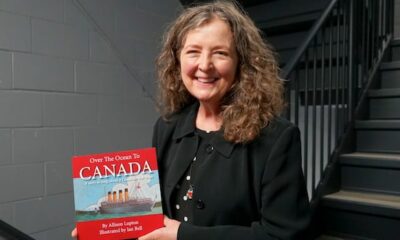Education
Dictionary.com and Cambridge Reveal 2023’s Words of the Year

In a notable release of their respective words of the year, both Dictionary.com and Cambridge have sparked discussions about language and contemporary culture. This year’s selections highlight evolving social dynamics and the impact of technology on communication.
Dictionary.com chose the term 6-7, which has become a source of humor and criticism. The word is described as an absurd interjection often used by teenagers, frequently accompanied by a hand-juggling motion to emphasize frustration towards adults. Commenters have pointed out the irony in Dictionary.com selecting a term that it claims cannot be defined, prompting a mixed response from language enthusiasts.
Conversely, Cambridge’s choice of the word parasocial raises more serious implications. Defined as a one-sided relationship where an individual feels a connection to someone they have never met—often a celebrity or fictional character—this term has been used in academic circles for decades. It was originally coined by American sociologists to describe the “illusion of intimacy” viewers felt with television personalities during the rise of television in the 1950s.
In recent years, the term gained traction in relation to the increasing prevalence of artificial intelligence, particularly AI companions. As technology continues to advance, the dynamics of human connection are evolving, leading to concerns about the implications of such relationships. The rise of social media and celebrity culture, exemplified by figures like Taylor Swift, has further entrenched this phenomenon, prompting questions about the nature of fandom and personal connections.
The announcement of these words coincides with the anticipation of the Oxford English Dictionary’s word of the year, which is still pending. The shortlist for Oxford includes terms like aura farming, biohack, and rage bait, with voting having ended recently. The term rage bait has garnered particular interest due to its relevance in today’s discourse on social media and public outrage.
As definitions evolve and new terms emerge, the conversation around language remains vibrant. Whether one prefers to stay informed or opts for a more blissful ignorance, the impact of these words speaks to the shifting landscape of communication in our increasingly digital world.
In conclusion, the words chosen by Dictionary.com and Cambridge not only reflect current trends but also illuminate broader societal changes. The discourse surrounding these selections invites further exploration into how language and technology shape our understanding of relationships and communication in the modern era.
-

 Politics3 weeks ago
Politics3 weeks agoSecwepemc First Nation Seeks Aboriginal Title Over Kamloops Area
-

 World4 months ago
World4 months agoScientists Unearth Ancient Antarctic Ice to Unlock Climate Secrets
-

 Entertainment5 months ago
Entertainment5 months agoTrump and McCormick to Announce $70 Billion Energy Investments
-

 Lifestyle4 months ago
Lifestyle4 months agoTransLink Launches Food Truck Program to Boost Revenue in Vancouver
-

 Science5 months ago
Science5 months agoFour Astronauts Return to Earth After International Space Station Mission
-

 Technology3 months ago
Technology3 months agoApple Notes Enhances Functionality with Markdown Support in macOS 26
-

 Top Stories2 months ago
Top Stories2 months agoUrgent Update: Fatal Crash on Highway 99 Claims Life of Pitt Meadows Man
-

 Lifestyle3 months ago
Lifestyle3 months agoManitoba’s Burger Champion Shines Again Amid Dining Innovations
-

 Politics4 months ago
Politics4 months agoUkrainian Tennis Star Elina Svitolina Faces Death Threats Online
-

 Sports5 months ago
Sports5 months agoSearch Underway for Missing Hunter Amid Hokkaido Bear Emergency
-

 Politics4 months ago
Politics4 months agoCarney Engages First Nations Leaders at Development Law Summit
-

 Technology5 months ago
Technology5 months agoFrosthaven Launches Early Access on July 31, 2025





















